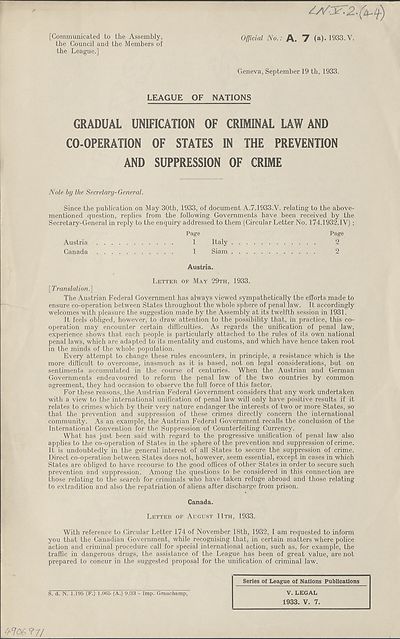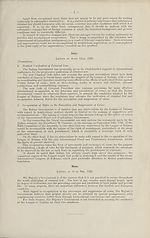Legal > Gradual unification of criminal law and co-operation of states in the prevention and suppression of crime [replies received from Austria, Canada, Italy Siam]
(1)
Download files
Complete book:
Individual page:
Thumbnail gallery: Grid view | List view

/-ArC£'.2.(/jr-/f)
[Communicated to the Assembly, Official No.: A. 7 (a). 1933. V.
the Council and the Members of
the League.]
Geneva, September 19 th, 1933.
LEAGUE OF NATIONS
GRADUAL UNIFICATION OF CRIMINAL LAW AND
CO-OPERATION OF STATES IN THE PREVENTION
AND SUPPRESSION OF CRIME
Note by the Secretary-General.
Since the publication on May 30th, 1933, of document A.7.1933.V. relating to the above-
mentioned question, replies from the following Governments have been received by the
Secretary-General in reply to the enquiry addressed to them (Circular Letter No. 174.1932.IV) :
Page Page
Austria 1 Italy 2
Canada 1 Siam 2
Austria.
Letter of May 29th, 1933.
[Translation.]
The Austrian Federal Government has always viewed sympathetically the efforts made to
ensure co-operation between States throughout the whole sphere of penal law. It accordingly
welcomes with pleasure the suggestion made by the Assembly at its twelfth session in 1931.
It feels obliged, however, to draw attention to the possibility that, in practice, this co¬
operation may encounter certain difficulties. As regards the unification of penal law,
experience shows that each people is particularly attached to the rules of its own national
penal laws, which are adapted to its mentality and customs, and which have hence taken root
in the minds of the whole population.
Every attempt to change these rules encounters, in principle, a resistance which is the
more difficult to overcome, inasmuch as it is based, not on legal considerations, but on
sentiments accumulated in the course of centuries. When the Austrian and German
Governments endeavoured to reform the penal law of the two countries by common
agreement, they had occasion to observe the full force of this factor.
For these reasons,.the Austrian Federal Government considers that any work undertaken
with a view to the international unification of penal law will only have positive results if it
relates to crimes which by their very nature endanger the interests of two or more States, so
that the prevention and suppression of these crimes directly concern the international
community. As an example, the Austrian Federal Government recalls the conclusion of the
International Convention for the Suppression of Counterfeiting Currency.
What has just been said with regard to the progressive unification of penal law also
applies to the co-operation of States in the sphere of the prevention and suppression of crime.
It is undoubtedly in the general interest of all States to secure the suppression of crime.
Direct co-operation between States does not, however, seem essential, except in cases in which
States are obliged to have recourse to the good offices of other States in order to secure such
prevention and suppression. Among the questions to be considered in this connection are
those relating to the search for criminals who have taken refuge abroad and those relating
to extradition and also the repatriation of aliens after discharge from prison.
Canada.
Letter of August 11th, 1933.
With reference to Circular Letter 174 of November 18th, 1932, I am requested to inform
you that the Canadian Government, while recognising that, in certain matters where police
action and criminal procedure call for special international action, such as, for example, the
traffic in dangerous drugs, the assistance of the League has been of great value, are not
prepared to concur in the suggested proposal for the unification of criminal law.
S. d. N. 1.195 (F.) 1.065 (A.) 9/33 - Imp. Granchamp,
Series of League of Nations Publications
V. LEGAL
1933. V. 7.
4-7<Y?7y
[Communicated to the Assembly, Official No.: A. 7 (a). 1933. V.
the Council and the Members of
the League.]
Geneva, September 19 th, 1933.
LEAGUE OF NATIONS
GRADUAL UNIFICATION OF CRIMINAL LAW AND
CO-OPERATION OF STATES IN THE PREVENTION
AND SUPPRESSION OF CRIME
Note by the Secretary-General.
Since the publication on May 30th, 1933, of document A.7.1933.V. relating to the above-
mentioned question, replies from the following Governments have been received by the
Secretary-General in reply to the enquiry addressed to them (Circular Letter No. 174.1932.IV) :
Page Page
Austria 1 Italy 2
Canada 1 Siam 2
Austria.
Letter of May 29th, 1933.
[Translation.]
The Austrian Federal Government has always viewed sympathetically the efforts made to
ensure co-operation between States throughout the whole sphere of penal law. It accordingly
welcomes with pleasure the suggestion made by the Assembly at its twelfth session in 1931.
It feels obliged, however, to draw attention to the possibility that, in practice, this co¬
operation may encounter certain difficulties. As regards the unification of penal law,
experience shows that each people is particularly attached to the rules of its own national
penal laws, which are adapted to its mentality and customs, and which have hence taken root
in the minds of the whole population.
Every attempt to change these rules encounters, in principle, a resistance which is the
more difficult to overcome, inasmuch as it is based, not on legal considerations, but on
sentiments accumulated in the course of centuries. When the Austrian and German
Governments endeavoured to reform the penal law of the two countries by common
agreement, they had occasion to observe the full force of this factor.
For these reasons,.the Austrian Federal Government considers that any work undertaken
with a view to the international unification of penal law will only have positive results if it
relates to crimes which by their very nature endanger the interests of two or more States, so
that the prevention and suppression of these crimes directly concern the international
community. As an example, the Austrian Federal Government recalls the conclusion of the
International Convention for the Suppression of Counterfeiting Currency.
What has just been said with regard to the progressive unification of penal law also
applies to the co-operation of States in the sphere of the prevention and suppression of crime.
It is undoubtedly in the general interest of all States to secure the suppression of crime.
Direct co-operation between States does not, however, seem essential, except in cases in which
States are obliged to have recourse to the good offices of other States in order to secure such
prevention and suppression. Among the questions to be considered in this connection are
those relating to the search for criminals who have taken refuge abroad and those relating
to extradition and also the repatriation of aliens after discharge from prison.
Canada.
Letter of August 11th, 1933.
With reference to Circular Letter 174 of November 18th, 1932, I am requested to inform
you that the Canadian Government, while recognising that, in certain matters where police
action and criminal procedure call for special international action, such as, for example, the
traffic in dangerous drugs, the assistance of the League has been of great value, are not
prepared to concur in the suggested proposal for the unification of criminal law.
S. d. N. 1.195 (F.) 1.065 (A.) 9/33 - Imp. Granchamp,
Series of League of Nations Publications
V. LEGAL
1933. V. 7.
4-7<Y?7y
Set display mode to:
![]() Universal Viewer |
Universal Viewer | ![]() Mirador |
Large image | Transcription
Mirador |
Large image | Transcription
Images and transcriptions on this page, including medium image downloads, may be used under the Creative Commons Attribution 4.0 International Licence unless otherwise stated. ![]()
| League of Nations > Legal > Gradual unification of criminal law and co-operation of states in the prevention and suppression of crime [replies received from Austria, Canada, Italy Siam] > (1) |
|---|
| Permanent URL | https://digital.nls.uk/190322822 |
|---|
| Shelfmark | LN.V |
|---|
| Description | Over 1,200 documents from the non-political organs of the League of Nations that dealt with health, disarmament, economic and financial matters for the duration of the League (1919-1945). Also online are statistical bulletins, essential facts, and an overview of the League by the first Secretary General, Sir Eric Drummond. These items are part of the Official Publications collection at the National Library of Scotland. |
|---|---|
| Additional NLS resources: |
|
